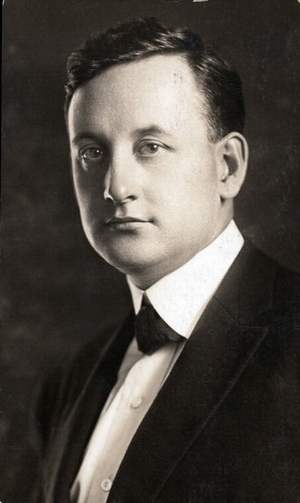|
Thoughts On Pseudonyms
by John E. Rutherford
Charles Hackett

|
|
In
a
back
copy
of
Hobbies
magazine
(November
1962)
I
came
across
an
article
that
listed
singers and their pseudonyms.
Some
were
very
sensible:
Edna
Brown
also
recorded
as Elsie Baker
(same
initials),
and Charles Harrison who
sang
a
great
many
Irish
songs
sometimes
recorded as Hugh
Donovan.
Some
singers
changed
their
names
in
World
War
I
because
of
anti-German
sentiment:
Albert
Wiederhold
became
Herbert
Stuart
and
Julia
Heinrich
became
Julia
Henry.
Others
apparently just
wanted
anonymity.
Both Arthur Fields
and
Vernon Dalhart
recorded
under the
name
"Mr.
X",
and Alice Verlet,
an
operatic soprano,
chose
"Madame
X"
on Pathe.
One of the names in the Hobbies
list
is
Charles
Hackett
whom,
in
1923,
Columbia called "the greatest
American
tenor
of
today."
The
article
says
that
he
used
the
pseudonym
of
Edwin
Dale.
I
have
several records of
"both" singers,
and
although
I
don't
enjoy
Hackett's voice,
I find that
Edwin
Dale's is bright
and fresh.
His
"Song of
Love"
by
Sigmund
Romberg
has
a
range
of
two octaves
which
Dale
handles
with
ease,
whereas
Hackett
often
strains
on his
top
notes when singing opera.
If these
two
men
are
indeed
one
and
the
same, one explanation might be that
the "Dale" records were
made early
in his career before
he
went
into
opera where he strained his voice.
Sometimes
pseudonyms
are
for
publicity:
Joseph
White
became
"The Silver-Masked Tenor"
- (Did he
wear
a mask
when
he
sang?) -
and
Arthur
Tracy
was
hardly
noticed
until he called himself "The Street
Singer."
But
why
would Billy
Whitlock,
the xylophone player, call himself
"Madame
Paula"?
And
did
Irving
Kaufman call himself
George
Beaver
on
Canadian records for patriotic
reasons?
There
are
other
pseudonymic
mysteries
that still
remain.
Recently I received an auction list
that
stated that
Carrie
Tubb
(a
pseudonym?)
was the sister
of the
famous
English
contralto,
Dame
Clara
Butt.
"Tubb"
is
"Butt"
spelled
backwards,
but I
have not
seen
any
other
evidence
-
slim,
indeed
- that
these
two
singers
were related.
Some musicians,
of
course,
do
not
need
pseudonyms
having
been
born with just the right names.
C.
Sharp
was
a
famous
musician
in
England,
and
C.
Sharp Minor played
the
organ.
Another
organist
blessed
with
a suitable
name
was
Henry Thunder.
And,
believe it or
not,
Mischa Violin (Edison Records)
played
the
violin.
A
friend
of
mine claims he heard of a contralto
called
Madame
Page-Thrower,
but
this
I
have
not
been
able
to
verify.
And
finally,
there
are
some
careers that
might
never
have got
off the ground without a pseudonym.
Doris
Kappelhof
became
famous
as
Doris Day.
Olga Hickenlooper
was a
very
good pianist but the Victor
Company suggested a change of name,
and
she
rose
to
fame
as
Olga
Samaroff,
later
to
become
Mrs.
Leopold Stokowski.
Who
knows?
Maybe we would have
heard
more
of
Royal
Fish if
he,
too,
had chosen
a pseudonym.
Even
in
a
pluralistic
society it
is
difficult
to
take
that
name
seriously when he is singing
"Where
the
Water Lilies
Grow"
(Edison
Record
50070)!
|